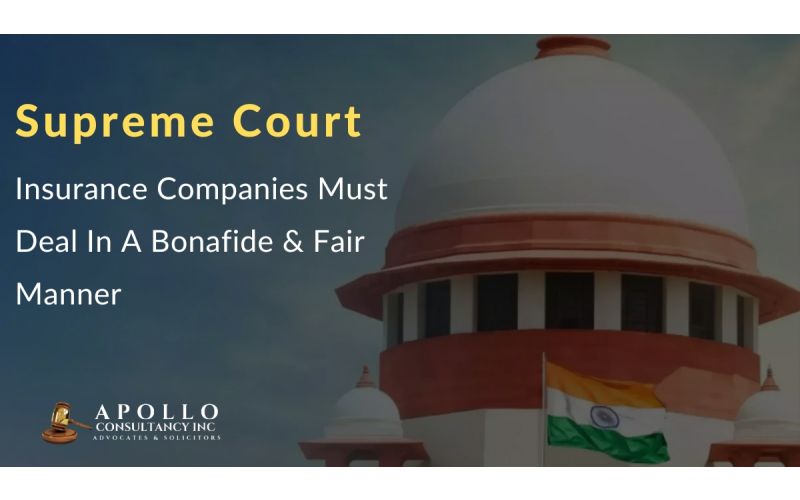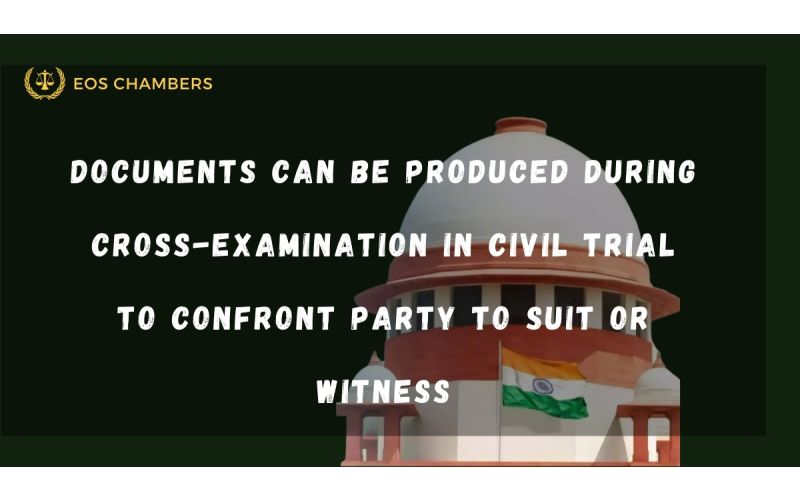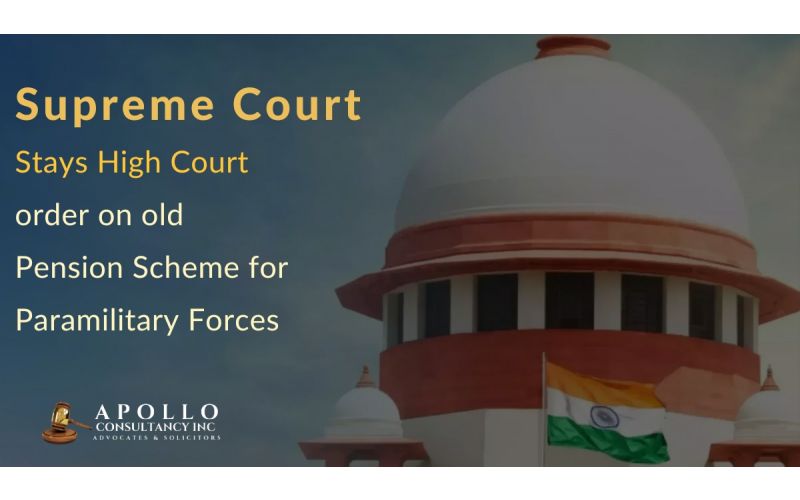Insurance Companies Must Deal In A Bonafide & Fair Manner ;

Insurance Companies Must Deal In A Bonafide & Fair Manner ; Should Not Just Care For Its Own Profits : Supreme Court
The Supreme Court observed that an insurance is expected to deal with the insured in a bonafide and fair manner and should not just care for and cater to its own profits.
It is the duty of the insurance company to disclose all material facts within their knowledge since the obligation of good faith applies to both equally, the bench of Justices AS Bopanna and Sanjay Kumar observed.
In this case, the complainant, who had undertaken prawn cultivation in an extent of 100 acres, had obtained insurance coverage from an Insurance Company. There was a major outbreak of a bacterial disease called ‘White Spot Disease’ along the east coast of Andhra Pradesh, which led to mass mortality of prawns. He invoked the policy but the Insurance company repudiated the appellant’s claim in its entirety, on the ground that there was a breach by the complainant of the policy conditions, inasmuch as records were not maintained properly and accurately. NCDRC, disposing his complaint, assessed his total loss as ₹30,69,486.80. Dissatisfied with this order, the complainant approached the Apex Court.
At the outset, the court noted that that uberrima fides, i.e., good faith, is the requirement in a contract of insurance.
“It it is the fundamental principle of insurance law that utmost good faith must be observed by the contracting parties; that good faith forbids either party from non-disclosure of the facts which the party knows; and that the insured has a duty to disclose and similarly it is the duty of the insurance company to disclose all material facts within their knowledge since the obligation of good faith applies to both equally. This obligation and duty would rest on both parties not only at the inception of the contract of insurance but throughout its existence and even thereafter.”
The bench noted that the insurance company baldly brushed aside the Death Certificate dated 01.05.1995 furnished by the officials of the State Fisheries Department at Visakhapatnam.
“Merely because the contents thereof were not to its liking, the insurance company could not have ignored the same and swept it under the carpet. More so, as such certification was being made by impartial and independent bodies of significant stature and that, perhaps, was precisely the reason why the insurance company had attached such importance to it in its norms. In any event, it is not open to an insurance company to ignore or fail to act upon a certificate or document that it had itself called for from independent and impartial authorities, subject to just exceptions, merely because it is averse to it or to its detriment. Having undertaken to indemnify an insured against possible loss in specified situations, an insurance company is expected to make good on its promise in a bonafide and fair manner and not just care for and cater to its own profits
Allowing the appeal, the court ordered that a sum of ₹45,18,263.20 shall be remitted by the insurance company to the appellant, with simple interest thereon @ 10% from the date of the complaint till the date of realization, within six weeks.
Isnar Aqua Farms vs United India Insurance Co. Ltd
Insurance Law – Uberrima fides, i.e., good faith, is the requirement in a contract of insurance – It is not open to an insurance company to ignore or fail to act upon a certificate or document that it had itself called for from independent and impartial authorities, subject to just exceptions, merely because it is averse to it or to its detriment. Having undertaken to indemnify an insured against possible loss in specified situations, an insurance company is expected to make good on its promise in a bonafide and fair manner and not just care for and cater to its own profit – It is the fundamental principle of insurance law that utmost good faith must be observed by the contracting parties; that good faith forbids either party from non-disclosure of the facts which the party knows; and that the insured has a duty to disclose and similarly it is the duty of the insurance company to disclose all material facts within their knowledge since the obligation of good faith applies to both equally. This obligation and duty would rest on both parties not only at the inception of the contract of insurance but throughout its existence and even thereafter. (Para 12-13)
Post Categories
Featured Posts
Latest Posts
Latest Posts

Anti-Money Laundering (AML) Compliance: Best Practices for Law Firms
In today's globalized economy, money laundering poses a significant threat to financial systems and institutions, including law firms. As facilitators of various financial transactions, law firms are often targeted by money launderers seeking to legitimize illicit funds. Anti-Money Laundering (AML) ...

Documents Can Be Produced During Cross-Examination In Civil Trial To Confront Party To Suit Or Witness : Supreme Court
In a notable judgment, the Supreme Court has held that a document can produced during cross-examination in a civil trial to confront a party to the suit or a witness. The Court also held that there is no distinction between ...

Won’t interfere with firecracker ban in Delhi: SC
Ahead of the festive season, the Supreme Court on Wednesday said that it would not interfere with a decision of a state government if it decides to impose a complete ban on firecrackers, including green crackers, to check pollution level ...

Supreme Court Stays High Court Order On Old Pension Scheme For Paramilitary Forces
The Supreme Court on Friday stayed the Delhi High Court judgment which held that the old pension scheme (OPS) will be implemented in the Central Paramilitary Forces (CAPF). During a brief hearing, a bench of Justices Sanjeev Khanna and Bela ...

Supreme Court Sides With Madras HC: Person Forwarding Social Media Messages Liable For Contents
The Madras High Court had noted that Shekher was a person of high stature and had many followers. It stated that he should have exercised more caution when forwarding messages. The Supreme Court refused to entertain an appeal challenging Madras ...

#𝐊𝐧𝐨𝐰𝐓𝐡𝐞𝐋𝐚𝐰 | 𝐂𝐚𝐧 𝐘𝐨𝐮 𝐅𝐢𝐫𝐞 𝐚𝐧 𝐄𝐦𝐩𝐥𝐨𝐲𝐞𝐞 𝐖𝐢𝐭𝐡𝐨𝐮𝐭 𝐍𝐨𝐭𝐢𝐜𝐞?
YES! 🚫 𝐎𝐧𝐥𝐲 𝐢𝐧 𝐞𝐱𝐜𝐞𝐩𝐭𝐢𝐨𝐧𝐚𝐥 𝐜𝐚𝐬𝐞𝐬 — like proven misconduct, criminal activity, or if the employment contract specifically permits termination without notice. 🧾 𝐔𝐧𝐝𝐞𝐫 𝐭𝐡𝐞 𝐈𝐧𝐝𝐮𝐬𝐭𝐫𝐢𝐚𝐥 𝐃𝐢𝐬𝐩𝐮𝐭𝐞𝐬 𝐀𝐜𝐭, 1947, and state-specific Shops & Establishment Acts, arbitrary dismissal can invite legal ...

Speak With Our
Get a Appointment
















